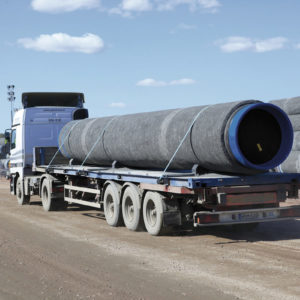Cargo Shipping to Canada? Important Information About Shipping Household Goods to Canada
Canada, the second largest country in the world, comprises 9.9 million square kilometers in land area. With a coastline spanning more than 5,500 miles, three oceans border Canada, the Arctic, the Pacific, and the Atlantic. Canada’s total population is around 4.3 million. Toronto is the biggest city in Canada, followed by Montreal, Vancouver, and the nation’s capital city, Ottawa.
If you are moving overseas to Canada, or returning to Canada after living in the United States or some other country for a while, you may need cargo shipping services to transport household goods, personal items, or to ship a car to Canada.
Canadian Customs Paperwork and Policies
When you are shipping cargo to Canada, it is important to note that all cargo shipments to Canada are subject to inspection by Canadian customs officials. In addition, there is some important paperwork you’ll need to have for cargo shipping to Canada and this includes:
Passport
Visa (if applicable)
Work permit (if applicable)
Inventory (in English or French). Provide a detailed list of all appliances and electronics and this includes make, model, serial number, etc.
Customs Manifest Form A8A
Declaration from previous airport or United States/ Canadian Border declaration paperwork
If you are importing goods to Canada, make sure you fill out an Importers Declaration for Customs form.
If you are a Canadian citizen and are returning to Canada after having lived outside of the country for a while, be prepared to provide residency information outside of Canada along with monthly statements, letter from an employer, rent receipts and/or income tax information.
You can ship used household goods and personal items to Canada duty free if you are a resident of Canada and are returning after being away for a year or more. This is also possible if you were a former resident of Canada who is now a resident of another country for at least a year.
If you have been living outside of Canada for at least a year, but less than five years, it is important to note that you should have owned your household items and personal goods for at least six months prior to cargo shipping to Canada. You may be required to provide a Bill of Sale and Registration paperwork to prove the age of your items in order to confirm that they qualify for duty free cargo shipping to Canada.
Once you arrive in Canada, you are not allowed to sell your personal items and household goods for at least a year after cargo shipping these items to Canada.
Restricted Items and Canadian Customs Policies
Some items are restricted from shipment to Canada. You may be required to pay duty fees and taxes on certain restricted items that you are cargo shipping to Canada. For example, any one item valued at $10,000 or more is dutiable if you are cargo shipping to Canada. In addition, you may be required to pay duty fees and taxes on tobacco products, radio equipment including walkie talkies and CBs, and office equipment (even used office equipment).
If you are importing alcohol to Canada, you should plan to have a list for Canadian customs officials with detailed information including size, type, and quantity, along with an Import Permit. You will be responsible to pay all applicable provincial and federal duties and taxes. It is also not advisable to ship wine to Canada between October and March due to the chance that it may be vulnerable to freezing temperatures.
You can ship food items to Canada in moderate quantities. Plants, sand, and any other material or matter must be accompanied by a Phytosanitary Certificate and Import Permit issued in advance by the Canadian Department of Agriculture.
If you are cargo shipping new items to Canada, be prepared to pay duty fees and taxes, and make sure you have the Bill of Sale for all the new items.Whether you need cargo shipping to Montreal, Toronto or Vancouver, a dependable overseas moving company like Cargo Experts can help you figure out all of the rules and regulations for cargo shipping to Canada.
There are a variety of rules pertaining to firearms if you are cargo shipping to Canada. For example, handguns require a special permit that is very rarely granted. Pistols, automatic firearms and revolvers are not allowed for sporting purposes and require a special Canadian Police Permit. Hunting rifles and shotguns for sporting purposes only are allowed in Canada. There are not restrictions on air pistols or air rifles as long as the muzzle velocity does not exceed 500 feet per second.
Prohibited Items and Canadian Customs Rules
As discussed above, many weapons, along with explosives, fireworks, and all ammunition are prohibited from shipment to Canada.
Other items that are prohibited from Cargo shipping to Canada include:
Narcotic drugs
Certain fruits and vegetables – You cannot ship frozen vegetables to Canada. Garlic chives, green onions, chives, leeks and other green Allium vegetables are prohibited from Canada. Potatoes are only allowed to enter Canada if they are peeled or packaged commercially.
Animal products that are on the endangered species list.
The Canadian Food Inspection Agency (CFIA) in partnership with the Canada Border Services Agency (CBSA) has implemented certain restrictions and safety precautions on vegetables at risk for containing E. coli.
Shipping a Car to Canada
If you are shipping a car or other motor vehicle to Canada, it is helpful for you to know the rules in advance. When you ship a car to Canada, the Canadian Motor Vehicle Safety and Emission Control Regulations apply to your vehicle. Any car or vehicle that is older than 15 years is subject to different regulations and typically expensive modifications may be necessary.
Make sure your vehicle has the “Statement of Compliance” label affixed by the manufacturer. If you are shipping your car or other motor vehicle to Canada for personal use, you can ship it duty free, but you may have to pay local taxes. It is important for you to fill out Canadian Customs Form K-22.
Immediate registration and licensing of your vehicle is required in Canada in order to be exempt from duty fees. You’ll also need paperwork that includes your vehicle registration information and proof of ownership.
Bringing a Pet to Canada
Many people moving overseas want to bring a favorite household pet along. If you are moving to Canada, you are allowed to bring your pet, but there are some important rules and regulations you should review in advance.
All pets entering Canada require an International Health and Inoculation Certificate and Inspection by the Department of Agriculture
Dogs, birds, livestock, and horses three months old or older from the United States can be imported to Canada as long as they are accompanied by a certificate signed and dated by a veterinarian, showing that the animal has been vaccinated against rabies within the last year.
Pets must be vaccinated at least 30 days prior to arrival in Canada.
In order to bring a pet to Canada with you, make sure your paperwork identifies the animal by breed, age, sex, color, and any distinguishing marks. In addition, it is important to note that upon arrival in Canada, quarantine will be required for some types of animals. The length of quarantine will be determined by Canadian officials and is dependent on the type of animal and the country of origin.
There is a lot to think about as you prepare to for international cargo shipping to Canada or anywhere else in the world. A dependable and reliable cargo shipping company can provide assistance with all the country-specific import and export rules and regulations. Choosing the right international cargo shipping company can help make your experience with international shipping and overseas moving positive. You can get a fast and free freight quote from Cargo Experts online or you can call toll free 1-866-994-7822 to learn more.



